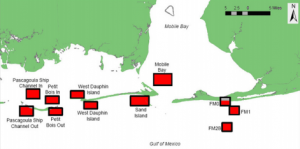The explosion of the Deepwater Horizon oil rig was of extreme concern to research scientists, environmental managers, and conservationists. Because of public health concerns, state and federal authorities quickly closed many areas of the northern Gulf of Mexico to recreational and commercial fishing. NGI researchers at the Dauphin Island Sea Lab immediately began studying the oil spill including what effect the closures and subsequent lack of fishing pressure had on fish populations.
Classroom Activity: Marine Protected Areas
During the oil spill, fishing bans created a temporary sanctuary (similar to a Marine Protected Area) across a large portion of the northern Gulf of Mexico. Marine Protected Areas (MPAs) are environments that have been reserved by federal, state, territorial, tribal, or local laws or regulations to provide lasting protection for part or all of the natural and cultural resources contained within. The level of protection varies from site to site depending on the desired management and conservation strategies. Information about the National MPA system can be found at http://marineprotectedareas.noaa.gov/nationalsystem.
Coastal Alabama and Mississippi Fish Communities – PDF 1.1MB

